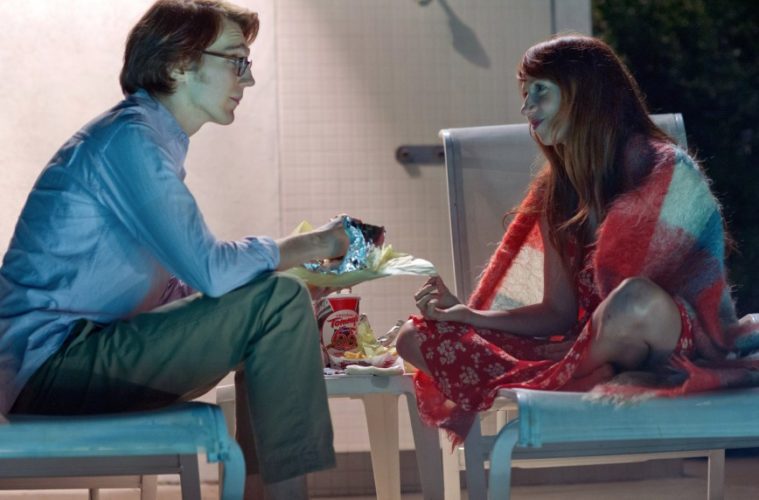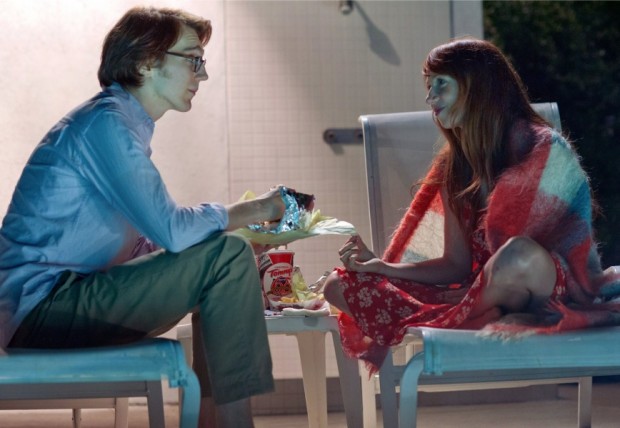
Out in limited release is Ruby Sparks, which manages to be familiar yet unique with darkness, humor, and a truth that is undeniable. Following a writer (Paul Dano) who finds out the dream girl (Zoe Kazan, who also wrote the script) he is currently creating in his next big novel is real, he explores the power that that gives him in sometimes shocking ways. Not quite a comedy, that trendy dramedy tag fits for directing duo Jonathan Dayton and Valerie Faris‘ follow-up to their hit Little Miss Sunshine. A few weeks ago I had the pleasure to sit down with Dano and Kazan as we discussed giving the audience a stand in, whether they brought it to producers with the rule that they would be in it, the incredible cast, and non-gendered writing. Check out the interview below.
The Film Stage: Chemistry was obviously not an issue for you guys. So was it fun to be in this together?
Zoe Kazan: You know, I have to say, I think we are getting less credit for this chemistry thing than we should be. I watch movies where people are together and so often I feel like that means less chemistry because you don’t have that tension and longing. We worked really hard. We didn’t kiss for like the first two weeks of filming to try to bring up that feeling of newness because we’ve been together for so long that the butterfly stage is long gone. But no, I’m glad there was chemistry. I was nervous.
Paul Dano: Yeah, me too. I mean, it was not without its challenges but work was really fun. Going home after a 14-hour day… being stuck in traffic and…
Kazan: Quarreling over the radio.
Dano: Little domestic issues. But I think it was pretty good.
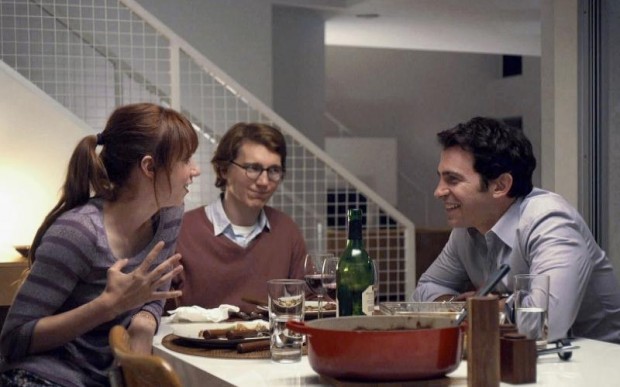
Do you challenge each other on a regular basis?
Kazan: Yeah.
Dano: I think so. I think that’s probably one of the best things that we do for each other. Challenge each other and hopefully inspire each other in some ways. And also respect each other’s work. So if we’re working together to allow each other to do what we do and also if we’re not working together to help give the person what they need.
What did you learn about each other that you didn’t know before doing this movie?
Kazan: Well, [looks at Dano], I guess I really learned what a pain in the ass you are.
[Everyone laughs]
Kazan: No, the truth is we took an executive producer credit on this film. And when I first started writing, I had never really let Paul so much into my writing process before. I like to show him my drafts and pages and stuff as I’m going. But I had never asked him to help me get it made, which is essentially what I did. He’s just got a great mind for producing. He was the person, late at night before we went to sleep, saying ‘We’ve got to make up a list of producers tonight because they’re going to talk to your agents tomorrow.’ He’s got a great business head and that was something I didn’t know. I mean, I suspected but I didn’t know. I feel like we talked about starting a production company together and it was neat to see that side of Paul because it’s like a hidden talent.

This is a very personal script. When you were shopping it around and trying to get it made, were you adamant that you had to be in this film?
Kazan: We were adamant. But we didn’t really, to tell you the truth, shop it around. We talked very early about us being in it. Maybe I was five pages into writing. And we both felt, even more than wanting to be in the movie, we really wanted to retain control over it. I could have sold this script and it could have been made into a very different kind of movie. So we only brought it to a handful of producers who were all independents. We brought it to them with the condition that we were going to act in it and the condition that it couldn’t be rewritten. It was sort of, ‘Either that’s the kind of movie you want to make or it’s not.’ We knew what kind of movie we wanted to make.
Dano: We also knew our first choice of director was Joh[athan Dayton] and Val[erie Faris] really early in Zoe’s writing. Probably ten pages in. That was sort of always the pole star and our dream choice. We knew that we wanted to aim high and where to start and it was sort of a take it or leave it thing. We went to a bunch of producers and those that were interested in working with Zoe and I and liked the script, met with us and we went from there. Luckily it wasn’t that hard. If Jonathan and Valerie had not signed on to the film then it would have been a totally different thing of ‘Who the hell’s going to direct this thing? How are we going to get it done?’ We got very lucky.
Is this the first time you’ve executive produced a movie?
Dano: No. No. I’ve done it on a couple small films. And for the most part, it’s sometimes silly when actors take that title and often it’s meaningless or it has to do with getting one extra point on back-end in an independent film where you don’t make any money up front. So it can be a totally insignificant thing. I think the reason that I’ve done it on a couple of films is just being involved very early in the process and hopefully helping to be a creative facilitator. Meaning helping to put it in the right hands if I have access to people that maybe a small filmmaker doesn’t. Or in this case, just trying to do my job since Zoe was the writer and just helping to facilitate. It’s not being on the phone with financiers.
So once you get on set you don’t wear an executive producer hat. It’s all about the acting. It’s all about the performance.
Dano: Yea. But I think that’s part of trying to make a good film. If you put it into the right hands, once you get there you hopefully don’t need to worry too much.
Kazan: That’s like how they say a director’s job is 90% casting.
Dano: And even once you have Jon and Val, they get a great line producer. Like this guy [Robert] Graf, who does a lot of The Coen Brothers films. OK, so then Jon and Val hopefully don’t have to worry as much about certain things. One thing leads to another.
Kazan: Chain of command.
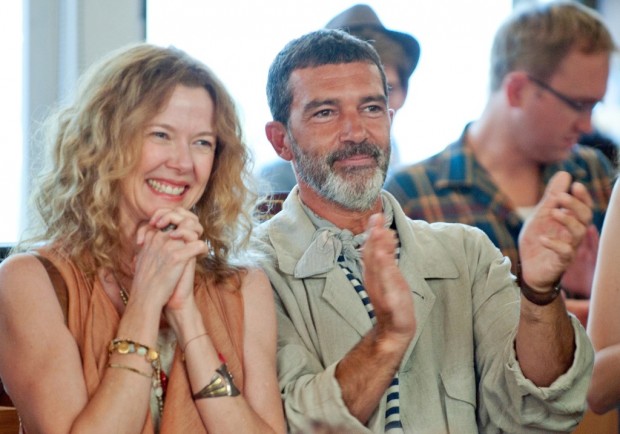
It’s interesting how the movie is about control but you’re talking about delegating it. To make sure you trust the people that you’re working with.
Kazan: Well, I think, as evidenced in the movie, ultimate control is an illusion and a dangerous thing to think that you have it. Obviously I have some issues with control otherwise I wouldn’t have written this movie, but so often I think what that really is is a deep desire to have someone competent take command. I think most control freaks don’t actually want to be in control. But that’s a larger subject.
We were talking with the directors about some of the other cast members. You’ve [looking at Dano] got a Who’s Who of folks that you’ve worked with, but how [was it to work alongside] Annette Bening and Antonio Banderas?
Dano: It was great. Zoe cried when she found out Annette said yes to the film. It was just a wonderful feeling to see it grow and see other people believe in it and be a part of it. I remember Jon and Val calling with the Antonio idea which totally caught us off guard but it was totally brilliant because he just couldn’t be more opposite from Calvin. So it was just a great idea. Getting to spend a few nights with those guys in this crazy house, being up all night doing a night shoot. It was a blast. And they all did a great job.
Zoe, do you always write male characters? Because Calvin’s character seems so fleshed out. We were talking with Jon and Val about how you really captured the male perspective when you are a female writer.
Kazan: Well, it’s a male protagonist, so he obviously was speaking clearly to me because it’s his story. He was dictating to me what he wanted and what he was doing. Sometimes you have this feeling of writing and feeling like you’re closing your eyes and walking forward in the dark. The character’s leading you forward. That’s how it feels to me when it’s working well. And Ruby did that more in the second half of the movie because it’s sort of both of their story more and not just Calvin’s story. And part of what I’m writing towards is sort of how when you first meet someone you have an idea of them and then you get to know them and that idea fades away. And that’s what I hope the audience’s experience of Ruby is. When they first meet her she’s a little more clouded and she becomes clearer over the course of the movie. I find men interesting. I have a lot of male friends and I don’t know… I just don’t think of writing as being gendered in that way where women writer women well and men write men well. I look at a movie like Annie Hall and I think Woody Allen created one of the most clear women I’ve ever seen on film or Hannah and Her Sisters. How does he know how sisters work? He knows by observing. And that’s how I feel about dudes.
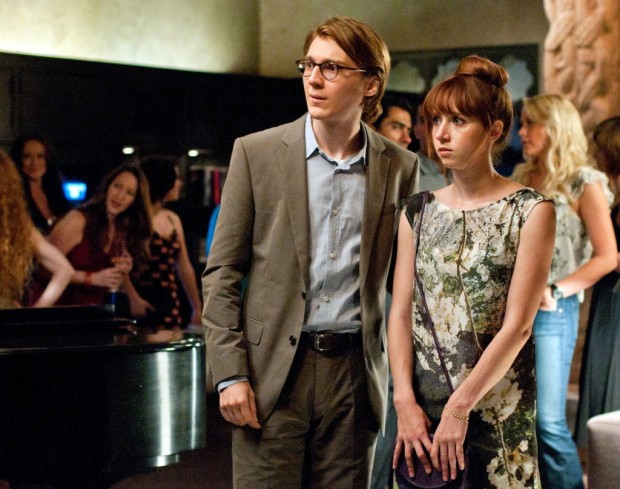
Did you [looks at Dano] have much input into Calvin? Into creating the character?
Dano: No. I mean, I don’t think I really wanted input because I wouldn’t want Calvin to get too close to me. I was very thankful that Zoe was not just putting our life down on the page. It was not that kind of film. She has much more imagination than that and doesn’t need to do that. I would try to talk to her about the film if that’s what she wanted as her boyfriend or friend. To be a bounce board and ask questions and give feedback. But also a lot of the times to try to say, ‘good job’ and ‘keep going.’
There’s a certain level of darkness in this film. The directors hinted at the fact that it was tough for you to write those scenes and work out the details. At any point did you think about pulling back and maybe not going that dark?
Kazan: No. It was really important to me. I think if you’re going to write a movie in which a man has control over a woman, you can’t dip a toe. Then it’s Bruce Almighty. I think if you’re really going to talk about that you have to allow it to go to it’s emotional, cathartic end. Some people feel that that darkness is in some way sexist, but I think it would be sexist not to show the darker side of control. Obviously the movie is still a comedy, so we don’t want it to become repulsion or something but yea. What do you think [looks at Dano]?
Dano: I think that was always where your writing was headed. That’s just a fine line to walk so maybe it takes just a little bit more care. And also Jon and Val are such an important part of that that they’re collaboration with Zoe is really making sure that where that goes is the best that it can be. But I think it’s hard just because it’s hard. Everybody wanted that.
Kazan: It’s hard because you have to have care.
Dano: But it was always headed there and I think that’s where the film had to go. And I think if Zoe had sold her script, a lot of other people would have kept the humor going there and it would have explored less. So I think it was the intention from the start.
Was there ever a thought of having Ruby take control over Calvin?
Kazan: No. But I think Ruby does have power over Calvin, it’s just not a magical power. One of the things that temps him back into changing her or writing her is the fear that he might lose her. She has free will and I think that that is scary. [Calvin’s brother] Harry says something, ‘it’s scary to love someone’. And it is. You know that that person does have power over you because you’ve given them your heart. But yea, that wasn’t part of the story I felt like I had to tell.
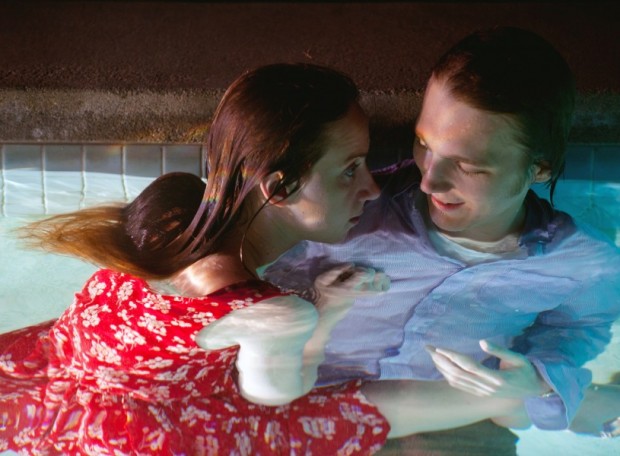
Did you always write the dog, Scotty, in there?
Kazan: Yes!
And I think my favorite line of the movie is when Calvin says, ‘the dog emasculates me, essentially, by peeing like a girl’.
Kazan: Yeah.
That dynamic worked. Did you always have that in the script?
Kazan: Yeah. Definitely. Scotty was in there from page two. I just thought the dog was such a sweet reminder of his helplessness. I just found it a funny way that he’s feeling foiled in his life.
It’s funny that you should mention that because I’m curious how you cast the dog. Was it a female dog or did you manage to find a male dog that peed like a girl?
Kazan: We found a male dog. I had written the part for a big dog, but Oscar, who plays Scotty, came in and stole everyone’s heart.
Dano: It was very transformational.
[Eveyone laughs]
Kazan: And he had a great trainer named Ray who trained him to squat.
Dano: I don’t think he liked it.
[Everyone laughs]
Kazan: He did not. Oscar had a lot of dignity. He was not a panderer. He wasn’t a ham. He wanted to be treated with respect. He was such a sweetie.
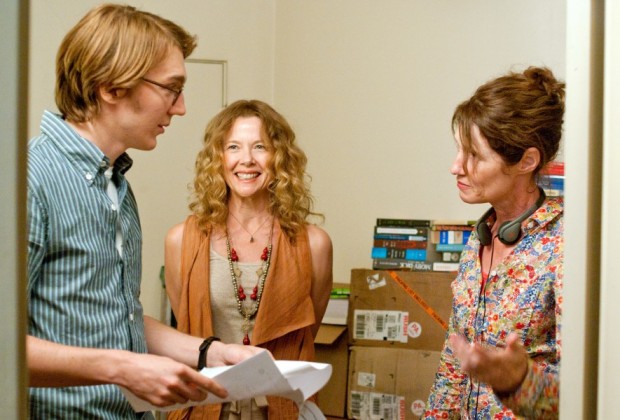
You get somebody like Elliott Gould, he brings a lot to a really small role in this film. Can you talk a little bit about working with Elliott Gould?
Dano: Yeah, I was so excited. The Long Goodbye is probably one of my favorite films, and I was so excited when Jon and Val came up with that idea. We had one day of filming the first week of filming so I had a great day with Elliott Gould. He’s a fascinating guy. He’s got so many stories. We had a lot of things in common, too, so we had some good chats. I wish he was on set more.
Can you talk about using a type writer?
Dano: Yea, it was hard. It was really fun to learn. It took a lot of strength and dexterity. Muscle-building. I got a trainer.
[Everyone laughs]
Dano: And it was just a really important character in the film itself. I remember going to Calvin’s house before we started filming and being in there alone a typing. The sound of that type writer in that big house was just so lonely. It really serves the film.
Writing Calvin’s brother’s reaction to meeting [Ruby] for the first time. It seems like that sequence would be very fun to write and create because you can throw out ideas and say, ‘this is how he would react to that. And this is what he would question.’ So was it interesting?
Kazan: Yeah. It’s such an important part of the movie because Harry, in a way, because he is a skeptic, he stands in for the audience. When he voices his concerned for Calvin’s sanity he’s sort of voicing the audience’s concern. When he believes, hopefully the audience believes with him. He’s sort of that logical bystander. So it was really important to me that those scenes be really funny but also be logical and it was fun to think of things. Like the French. What would be good proof. And, of course, his delight in this thing allows the audience to relax and feel like ‘OK, we’re safe. He finds this funny. I’m allowed to find this funny.’ I obviously wasn’t in all of those scenes but getting to watch… I’ll never forget watching Chris [Messina] and Paul film the scene in the car outside when he’s freaking out and Chris is so funny in that scene.
Ruby Sparks is now in limited release.

